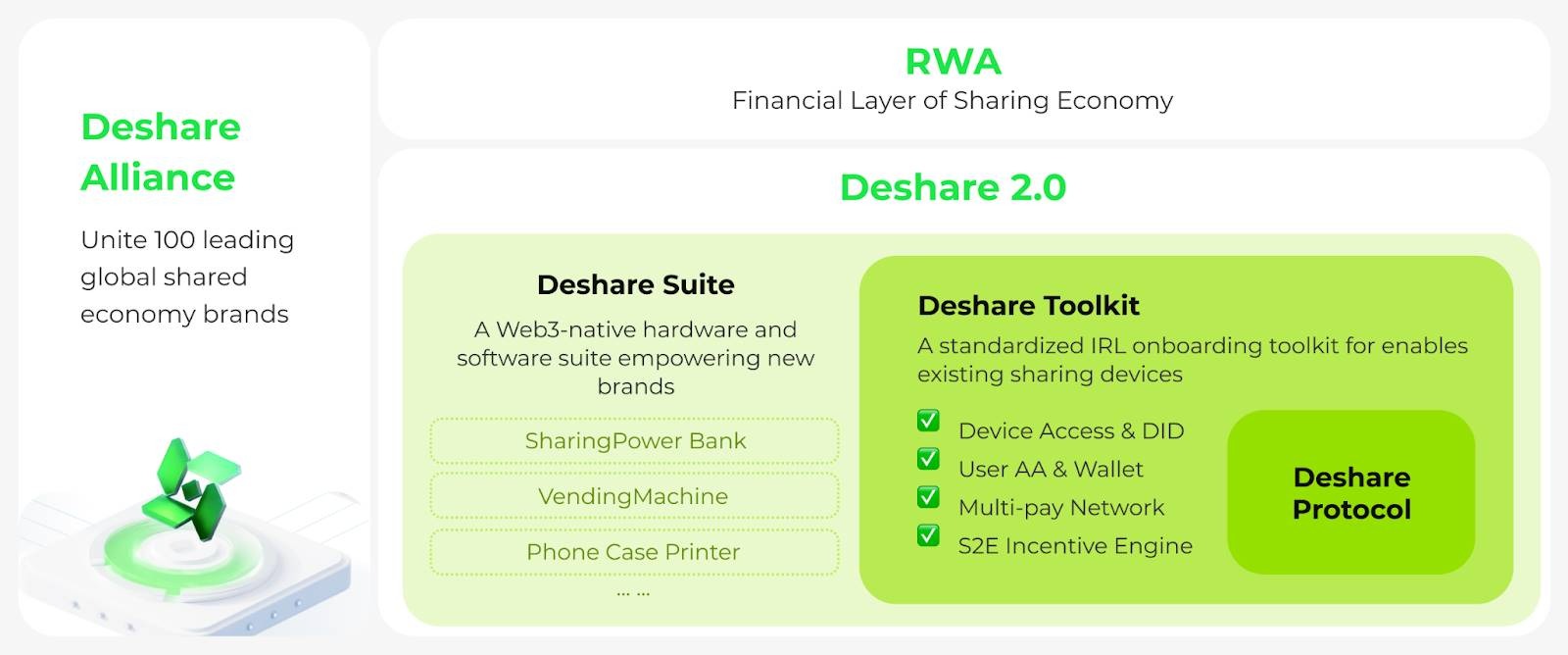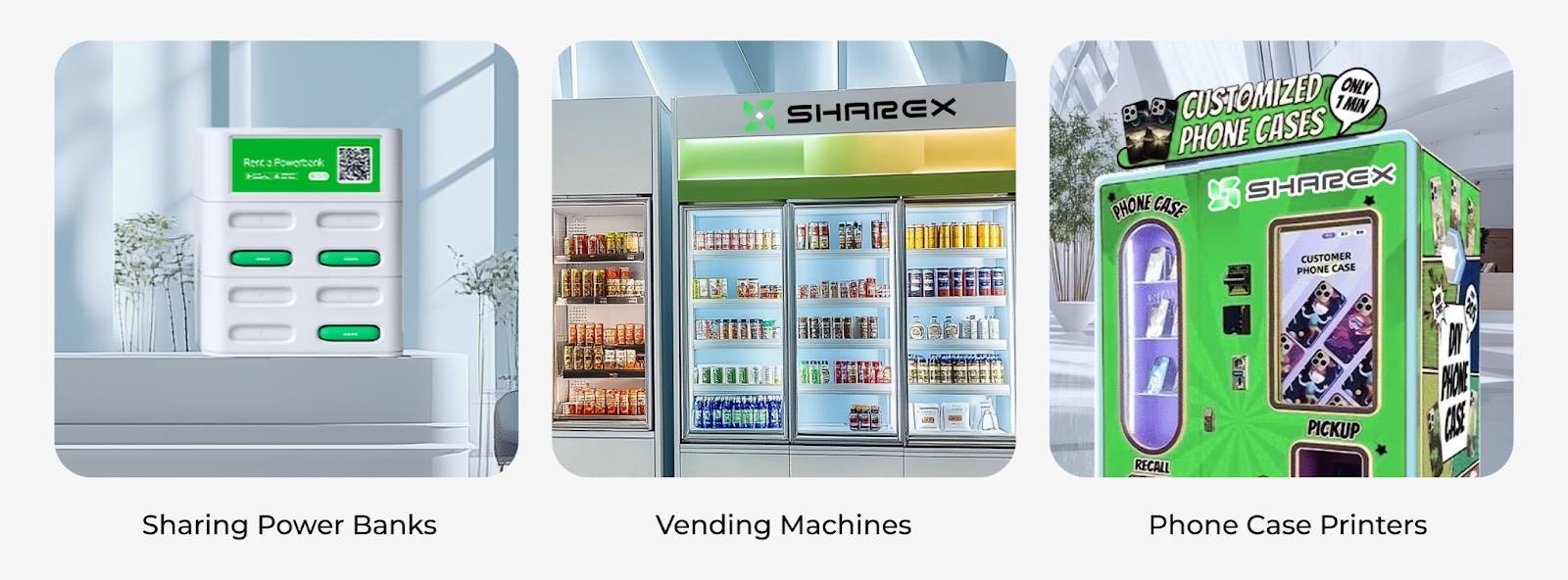ShareX releases Deshare 2.0, defining a new standard for real-world asset blockchains
Reposting original title: “From Trusted Data to Trusted Devices: ShareX Launches Deshare 2.0, Setting a New Standard for Real-World Asset On-Chain Integration”
From day one, Deshare has been redefining how real-world devices connect to Web3: transforming distributed IoT usage data into verifiable, settleable, and tradable on-chain value, accelerating the scaled adoption of DePIN and RWA.
Today, ShareX officially announces Deshare 2.0—delivering hardware-level on-chain capabilities, a three-tier product architecture, and launching the second global recruitment round for the Deshare Alliance.
Deshare: Evolving from “Trusted Data” to “Trusted Devices”
As part of the BNB Chain MVB 10 Accelerator Program, ShareX is committed to building the connective layer between the real world and blockchain, laying the foundation for Web3 sharing economy infrastructure. By integrating with over 100 leading sharing economy brands globally, ShareX delivers standardized offline device on-chain toolkits and end-to-end solutions, bringing massive real-world devices and use cases on-chain, and closing the Real-World Actions → Assets → Adoption loop.
Yet, as the industry moves from proof-of-concept to scale, legacy challenges in the sharing economy have become critical bottlenecks: opaque data, unfair distribution, centralized monopolies, and data fraud. Business system data no longer objectively reflects the real-world operation of shared devices, and the resulting “trust crisis” poses major obstacles to brand financing and growth.
Deshare 2.0 addresses this with “trusted devices”: cryptographic signing at the device/edge, followed by on-chain anchoring. Batch commitments significantly reduce on-chain costs, and privacy and compliance are managed via “on-chain proofs, off-chain plaintext.”
Without hardware modifications or business disruption, Deshare has already enabled numerous brands and tens of thousands of shared economy devices to integrate with Web3. From shared power banks and vending machines to mobility and energy terminals, Deshare 2.0 advances “trusted data” to “trusted devices,” establishing a deterministic foundation for real-world asset tokenization.
Three-Tier Product Architecture: Standardized IRL Device Access Layer

1. Deshare Protocol: Core Trust Layer
The Deshare Protocol is the trust engine and core protocol layer of the Deshare architecture, defining and anchoring the “Minimum Verifiable Facts” of the real world.
It operates as a decentralized state machine, recording, verifying, and settling real-world events so every device action, payment, or data update is cryptographically verifiable on-chain.
Key functions:
- Identity & Ownership:
Handles device DID registration and brand/operator binding, establishing trusted on-chain identity and ownership relationships.
- Data Proofs:
Anchors events, usage, and payment data using Merkle Roots, hashes, or CID pointers, and leverages versioned schemas to ensure data is both verifiable and evolvable.
- Settlement State Machine:
Implements business logic such as collections, revenue sharing, reconciliation, and reversals as on-chain state transitions, enabling automated and auditable settlement processes.
- Privacy & Selective Disclosure:
“Truth on-chain, bytes off-chain”—on-chain storage of states and proofs with plaintext and logs retained off-chain, balancing transparency and privacy.
In essence, the Deshare Protocol turns “trust” into a programmable asset, enabling real-world data, identity, and economic activity to become verifiable, shareable, and monetizable within Web3.
2. Deshare Toolkit: Standardized Access Layer
The Deshare Toolkit is a comprehensive standardized access suite that enables existing shared devices and services to rapidly connect to Web3, empowering traditional operators to upgrade their infrastructure to blockchain without altering their original architecture.
It unlocks the full potential of sharing economy brands, enabling trusted, seamless connections between “real-world devices ↔ on-chain economies.”
Key capabilities include:
- Deshare Protocol Integration:
Establishes trusted device identity and verifiable data channels, enabling data to go on-chain without hardware or business logic changes, eliminating industry-wide data fraud and trust issues.
- User AA & Wallet Layer:
Supports account abstraction (AA), gasless interactions, social logins, and mini-app wallet integration, allowing users to access Web3 with minimal friction and generate verifiable, session-based credentials for authentic and trusted participation.
- Multi-Pay Network:
Unifies fiat and crypto payment channels, supporting orchestrated payments globally, with verifiable receipts, reconciliation hashes, and transparent settlement records.
- Incentive Engine:
Dynamically links verified device, user, and payment data, building flexible incentive triggers and supporting growth models like Share-to-Earn and performance-driven brand incentive systems.
To date, ShareX has partnered with nearly 20 leading global sharing brands via the Deshare Toolkit, achieving large-scale integration of real devices with on-chain economies.
3. Deshare Suite: Integrated Solution Layer
Deshare Suite is a Web3-native hardware and software solution suite launched by ShareX, leveraging years of supply chain experience and global market insights, designed for innovative brands entering the sharing economy from the ground up.
It integrates device connectivity, data on-chain, and economic settlement across the entire value chain, converting real-world usage into verifiable digital value. Deshare Suite currently supports on-chain integration and commercialization of devices like shared power banks and vending machines, and will continue expanding into broader sharing economy scenarios.
With Deshare Suite, brands can rapidly complete the full cycle from device deployment → trusted data on-chain → revenue settlement → user incentives, truly achieving “real asset digitization, digital asset verifiability.”

ShareX has joined forces with multiple partners to build a new generation of Web3-powered sharing economy innovation brands via Deshare Suite, driving trusted on-chain integration and value realization of real-world assets.
Technical Breakthrough: Hardware-Level On-Chain Integration
The core innovation of Deshare 2.0 is edge-level on-chain verification—enabling devices to perform cryptographic signing and data anchoring locally, ensuring data authenticity and verifiability at the source and bridging the final gap between real-world actions and on-chain trust.
Its Edge Integration Module delivers verifiable identity generation, local signing, offline buffering, and automatic sync, combined with privacy encryption and Merkle-based batch on-chain mechanisms for low-cost, scalable, tamper-proof trusted data on-chain integration.
To support devices with varying computational power, Deshare 2.0 offers four edge access modes: cloud gateway adaptation, lightweight SDK integration, secure hardware module access, and, in the future, TEE + ZK privacy verification. Together, these create a unified, trusted access layer for diverse sharing economy and unmanned retail scenarios, enabling every real-world device—from shared power banks to industrial-grade IoT terminals—to become a Web3-native node.
This breakthrough enables Deshare 2.0 to serve as a “hardware oracle” bridging real devices and blockchain, allowing billions of IoT devices to seamlessly integrate with Web3 trust infrastructure, and unlocking deep convergence between the real and on-chain worlds.
Global Adoption: From Brand Integration to Industry Standard
From shared charging and unmanned retail to logistics equipment, Deshare 2.0 is becoming the industry standard for trusted on-chain integration of Web3 devices.
By transforming every device into a verifiable data node, Deshare achieves unified, verifiable data, capital, and value flows, providing a trusted foundation for DePIN and RWA.
- PowerNow is a leading Asian shared charging brand operating in Japan, Singapore, Malaysia, Thailand, and more. By integrating the Deshare Toolkit, PowerNow has brought over 4,000 merchants and 20,000 shared power bank devices on-chain, building one of the world’s first trusted, verifiable sharing economy DePIN networks.
- Netcharge, a Kazakhstan-based shared charging brand, is the first in the CIS region to deploy fast-charging technology in its sharing network. Using Deshare Suite, Netcharge rapidly deployed thousands of Web3-native shared charging devices and supporting software, enabling efficient local Web3 business launches and trusted operations.
- YoPoint, a global leader in unmanned retail, operates in over 120 countries with more than 75,000 smart vending machines in commercial and public spaces. YoPoint integrated Deshare 2.0 into its Android-based edge OS, enabling trusted data collection at the hardware level and laying a strong foundation for its RWA business expansion.
These cases demonstrate how real-world enterprises can rapidly transform into decentralized, data-driven new economies using Deshare infrastructure.
Deshare Alliance: Second Global Recruitment Now Open
The first phase of the ShareX Deshare Alliance brought together over 20 leading sharing economy brands worldwide, spanning 22 countries and 9 high-frequency consumer scenarios—including shared charging, shared mobility, vending, and distributed computing. The alliance connects 8,600+ merchants, 540,000+ integrable devices, and serves over 8.37 million users, building a global Web3 physical gateway network and laying a robust foundation for Web3 adoption in the real world.
ShareX has now officially opened the second round of Deshare Alliance recruitment.
Target Participants
- Sharing economy brands and device manufacturers
- Web3 and DePIN project teams
- Payment institutions and infrastructure partners
- Node operators and ecosystem builders
Alliance Benefits
- Priority access to Deshare Toolkit and Deshare Suite
- Joint marketing and brand collaboration
- RWA / DePIN joint issuance programs
- ShareX ecosystem governance and project co-development
Join Deshare 2.0: https://forms.gle/tnDKKLUy4X2ektsc9
In Closing: Making Trust the Foundation
Deshare 2.0 marks a new milestone for sharing economy infrastructure: advancing from “trusted data” to “trusted devices.”
ShareX will continue to enhance protocol integration, consumer-grade RWA solutions, and alliance governance, providing more open and reliable core capabilities for global enterprises and developers.
Welcome to Deshare 2.0.
Statement:
- This article is reprinted from [TechFlow], original title “From Trusted Data to Trusted Devices: ShareX Launches Deshare 2.0, Setting a New Standard for Real-World Asset On-Chain Integration.” Copyright belongs to the original author [TechFlow]. If you have any objections to the reprint, please contact the Gate Learn Team ), and we will promptly address your concerns according to our procedures.
- Disclaimer: The views and opinions expressed in this article are solely those of the author and do not constitute investment advice.
- Other language versions of this article are translated by the Gate Learn Team. Unless Gate is explicitly mentioned, translated articles may not be copied, distributed, or plagiarized.
Related Articles

The Future of Cross-Chain Bridges: Full-Chain Interoperability Becomes Inevitable, Liquidity Bridges Will Decline

Solana Need L2s And Appchains?

Sui: How are users leveraging its speed, security, & scalability?

Navigating the Zero Knowledge Landscape

What is Tronscan and How Can You Use it in 2025?
